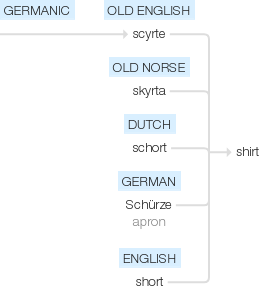Shirt
Old English scyrte, of Germanic origin; related to Old Norse skyrta (compare with skirt), Dutch schort, German Schürze ‘apron’, also to short; probably from a base meaning ‘short garment’.
wiktionary
From Middle English sherte, shurte, schirte, from Old English sċyrte(“a short garment; skirt; kirtle”), from Proto-West Germanic *skurtijā, from Proto-Germanic *skurtijǭ(“a short garment, skirt, apron”).
Cognate with Saterland Frisian Schoarte(“apron”), Dutch schort(“apron”), German Schürze(“apron”), Danish skjorte(“shirt”), Norwegian skjorte(“shirt”), Swedish skjorta(“shirt”), Faroese skjúrta(“shirt”), Icelandic skyrta(“shirt”).
English skirt is a parallel formation from Old Norse; which is a doublet of short, from the same ultimate source.
From Middle English sherten, shirten (also shorten), from the noun (see above).
etymonline
shirt (n.)
Old English scyrte "skirt, tunic," from Proto-Germanic *skurtjon "a short garment" (source also of Old Norse skyrta, Swedish skjorta "skirt, kirtle;" Middle Dutch scorte, Dutch schort "apron;" Middle High German schurz, German Schurz "apron"), related to Old English scort, sceort "short," from PIE root *sker- (1) "to cut," on the notion of "a cut piece."
Formerly of the chief garment worn by both sexes, but in modern use long only of that for men; in reference to women's tops, reintroduced 1896. Bloody shirt, exposed as a symbol of outrage, is attested from 1580s. To give (someone) the shirt off one's back is from 1771. To lose one's shirt "suffer total financial loss" is from 1935. To keep one's shirt on "be patient" (1904) is from the notion of (not) stripping down for a fight.
